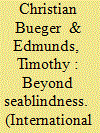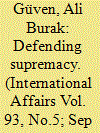|
|
|
Sort Order |
|
|
|
Items / Page
|
|
|
|
|
|
|
| Srl | Item |
| 1 |
ID:
157969


|
|
|
|
|
| Summary/Abstract |
This article examines the rise of maritime security in concept and practice. We argue that developments in the maritime arena have flown beneath the radar of much mainstream international relations and security studies scholarship, and that a new agenda for maritime security studies is required. In this article we outline the contours of such an agenda, with the intention of providing orientation and direction for future research. Our discussion is structured into three main sections, each of which outlines a core dimension of the maritime security problem space. We begin with a discussion of the issues and themes that comprise the maritime security agenda, including how it has been theorized in security studies to date. Our argument is that the marine environment needs to be understood as part of an interlinked security complex, which also incorporates strong connections between land and sea. Second, we examine the ways in which maritime security actors have responded to these challenges in practice, focusing on issues of maritime domain awareness, coordination of action, and operations in the field. Third, we turn to the mechanisms through which the new maritime security agenda is being disseminated to local actors through a process of devolved security governance. We focus particularly on efforts to distribute knowledge and skills to local actors through capacity building and security sector reform. In the conclusion, we outline the future challenges for maritime security studies that follow from these observations.
|
|
|
|
|
|
|
|
|
|
|
|
|
|
|
|
| 2 |
ID:
155480


|
|
|
|
|
| Summary/Abstract |
It is widely acknowledged today that the rise of new powers in the global economy has failed to produce commensurate adjustments in the architecture of global economic governance. How, then, do established multilateral organizations navigate the challenges arising from growing multipolarity? The article tackles this question by examining recent International Monetary Fund (IMF) and World Bank practice. It argues that, resistant though the Bretton Woods twins are to comprehensive reform, they nonetheless employ mechanisms to cope with the new realities on the ground. However, this adaptation lacks a cohesive strategy, and on balance remains insufficient. The analysis launches from a discussion of the normative, operational and competitive challenges the Fund and Bank face. It then discusses three coping mechanisms the organizations have employed over the past decade: 1) bolstering operations in low-income countries (LICs) and small middle-income countries (MICs); 2) adopting a flexible approach towards large MICs and in particular emerging powers to retain them in the organizations' client portfolio; and 3) reinforcing and refining non-lending activity to preserve normative authority. The effectiveness of these adaptive efforts in addressing the challenges of multipolarity is variable, comprising a mix of modest gain, abject failure and untested promise. Implications for the organizations' efficacy also remain uncertain. Even then, these initiatives highlight the twins' willingness to defend their institutional supremacy in a fast-changing global system. Crucially, they also harbour important signs of change in how ‘development’ is perceived and practised in the strongholds of western multilateralism.
|
|
|
|
|
|
|
|
|
|
|
|
|
|
|
|
|
|
|
|
|